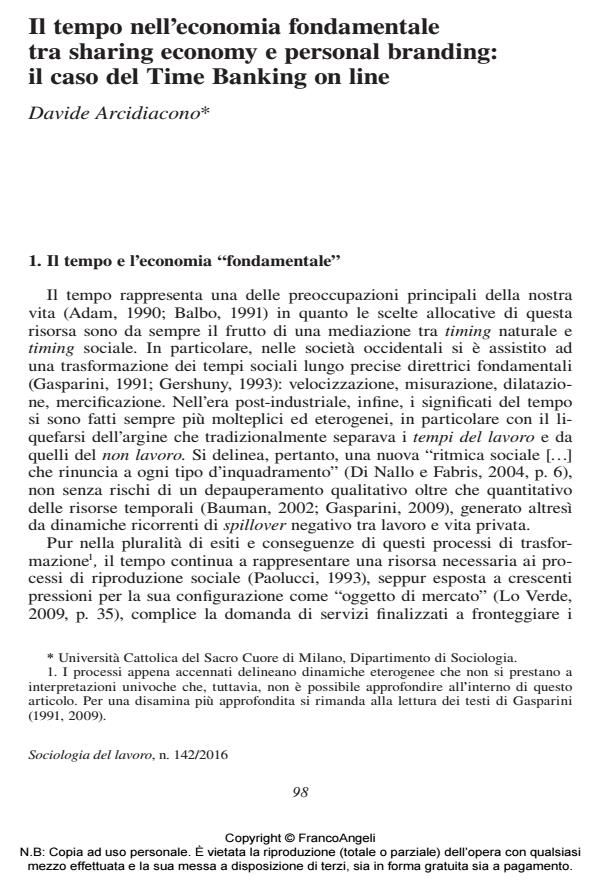Time in the foundational economy between sharing economy and personal branding: the case of Time Banking online
Journal title SOCIOLOGIA DEL LAVORO
Author/s Davide Arcidiacono
Publishing Year 2016 Issue 2016/142
Language Italian Pages 17 P. 98-114 File size 148 KB
DOI 10.3280/SL2016-142006
DOI is like a bar code for intellectual property: to have more infomation
click here
Below, you can see the article first page
If you want to buy this article in PDF format, you can do it, following the instructions to buy download credits

FrancoAngeli is member of Publishers International Linking Association, Inc (PILA), a not-for-profit association which run the CrossRef service enabling links to and from online scholarly content.
Time is a scarce resource and its organization are one of the major concerns of contemporary life, becoming more and more a market “object” for value extraction strategy. However, there are institutions that overturn this trend: time banks. Though time-banking services time is not simply a scarce resource but a new means of exchange based on reciprocity scheme. Time banks, as a model of an alternative transaction to the market exchange redefined following the logic of the sharing economy. The article aims to analyze the opportunities and the limitations by examining a case study, of an online platform for Time-Banking. The research follows a net-nographic approach combining data collected with those obtained through a survey of users that examines the issue of the purpose and interactions with other forms of economic exchange between on-line and off-line.
Keywords: Collaborative economy, time-banking, reciprocity, digital platforms
- De Certau M. (2001). L’invenzione del quotidiano. Roma: Edizioni Lavoro.
- Di Nallo E. Fabris G. (2004). L’esperienza del tempo di consumo tra pratiche e fruizione sociale. Milano: FrancoAngeli.
- Dubois E.A., Schor J., Carfagna L.B. (2014). New cultures of connection in a Boston time bank. In: Schor J.B., Thompson C.J., eds., Sustainable Lifestyles and the Quest for Plenitude: Case Studies of the New Economy. New Haven: Yale University Press.
- Dujarier M.A. (2009). Il lavoro del consumatore. Come co-produciamo ciò che compriamo. Milano: Egea. Franchi M., Schianchi A. (2011). Scegliere nel tempo di Facebook. Come i social network influenzano le nostre preferenze. Roma: Carocci.
- Fukuyama F. (1996). Trust: The Social Virtues and The Creation of Prosperity. New York: Free Press.
- Gasparini G. (1994). La dimensione sociale del tempo. Milano: FrancoAngeli.
- Gasparini G. (2009). Tempi e ritmi nella società del 2000. Milano: FrancoAngeli.
- Gershuny J. (1993). L’innovazione sociale. Tempo, produzione e consumi. Cosenza: Rubettino.
- Granovetter M. (1985). Economic Action and Social Structure: the problem of Embeddedness. American Journal of Sociology, 91: 481-510.
- Hamalainen T.J., Heiskala R., eds. (2007). Social Innovations, Institutional Change and Economic Performance. Cheltenham: Edward Elgar.
- Hardin G. (1968). The Tragedy of the Commons. Science, 162: 1243-1248.
- Kozinets R.V. (2009). Doing Ethnographic Research Online. Londra: Sage.
- Latouche S. (2004). Altri mondi, altre menti, altrimenti. Oikonomia vernacolare e società conviviale. Soveria Mannelli: Rubettino.
- Lo Verde F. (2009). Sociologia del tempo libero. Roma-Bari: Laterza.
- Malinowski B. (1922). Argonauts of the Western Pacific. An Account of Native Enterprise and Adventure in the Archipelagoes of Melanesian New Guinea. New York: Dutton.
- Mauss M. (1924). Essai sur le don. Forme et raison de l’échange dans les sociétés archaïques. L’Année Sociologique, I: 30-186.
- Morace F. (2015). Crescita felice. Percorsi di futuro civile. Milano: Egea.
- Mutti A. (2007). Reputazione. Rassegna Italiana di Sociologia, n. 4: 601-622.
- Mutti A. (2003). Le teorie della fiducia nelle ricerche sul capitale sociale. Rassegna Italiana di Sociologia, n. 4: 515-536.
- Ostrom E. (2002). The Drama of the Commons. Washington: National Academies Press.
- Pais I. (2012). La rete che lavora. Mestieri e professioni nell’era digitale. Milano: Egea.
- Pais I., Del Moral L. (2015). Collaborative Economy and the Digitalization of Timebanking: Opportunities and challenges. Studi di Sociologia, n. 19: 3-21.
- Pais I., Provasi G. (2015), Sharing economy: a step towards ‘re-embedding’ the economy? Stato e Mercato, 105: 347-377.
- Paolucci G. (1993). Tempi postmoderni. Per una sociologia del tempo nelle società industriali avanzate. Milano: FrancoAngeli.
- Parra Saiani P. (2001). Triangolazione e processi valutativi. Rassegna Italiana di Valutazione, 24: 49-67.
- Polanyi K. (1944). The Great Transformation, New York (trad. it.: La grande trasformazione. Torino: Einaudi, 1974).
- Turner H. (2007). Mystery Shopping. In: Aa.Vv., Market research Handbook. Chichester: Wiley & Son.
- Adam B. (1990). Time and Social Theory. Cambridge: Polity Press.
- Anderson B. (1996). Comunità immaginate: origini e diffusione dei nazionalismi. Roma: Manifestolibri.
- Arcidiacono D. (2013). Consumatori attivi. Scelte di acquisto e partecipazione per una nuova etica economica. Milano: FrancoAngeli.
- Balbo L. (1991). Tempi di Vita. Milano: Feltrinelli.
- Bauman Z. (2002). Modernità liquida. Roma-Bari: Laterza.
- Belk R. (2014). Sharing Versus Pseudo-Sharing in Web 2.0. Anthropologist, 18: 7-23.
- Benkler Y., Nissembaum H. (2006). Commons-based Peer Production and Virtue. The Journal of Political Philosophy, 14: 394-419. DOI: 10.1111/j.1467-9760.2006.00235.x
- Bentham J. et al. (2013). Manifesto for the Foundational Economy. Cresc Working Paper, 131: 1-23.
- Botsman R., Rogers R. (2010). What’s Mine Is Yours: The Rise of collaborative Consumption. Londra: Harper Business.
- Bowman A., Ertürk I., Froud J., Johal S., Law J., Leaver A., Moran M., Williams K. (2014). The end of the experiment? From competition to the foundational economy. Manchester: Manchester University Press.
- Economia collaborativa e startup:forme alternative di scambio economico o mito della disintermediazione? Davide Arcidiacono, in Quaderni di Sociologia /2017 pp.29
DOI: 10.4000/qds.1656 - Sharing time: new forms of reciprocity in the digital economy Davide Arcidiacono, Antonello Podda, in Work Organisation, Labour and Globalisation /2017
DOI: 10.13169/workorgalaboglob.11.2.0039 - Multidisciplinary Design of Sharing Services Davide Arcidiacono, Ivana Pais, pp.81 (ISBN:978-3-319-78098-6)
Davide Arcidiacono, Il tempo nell’economia fondamentale tra sharing economy e personal branding: il caso del Time Banking on line in "SOCIOLOGIA DEL LAVORO " 142/2016, pp 98-114, DOI: 10.3280/SL2016-142006